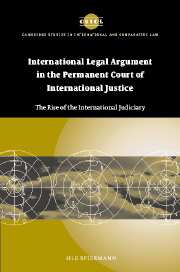 International Legal Argument in the Permanent Court of International Justice
International Legal Argument in the Permanent Court of International Justice Book contents
- Frontmatter
- Contents
- Foreword
- Acknowledgments
- Table of cases
- Table of treaties
- List of abbreviations
- Part 1 The Permanent Court of International Justice
- Part 2 International legal argument
- Part 3 International legal argument in the Permanent Court of International Justice
- 4 Revisiting the Permanent Court
- 5 The foundational period, 1922–1924
- 6 An international lawyer's approach, 1925–1930
- 7 A national lawyer's approach, 1931–1940
- Part 4 General conclusions
- Appendix: List of Advisory Opinions, Judgments and Orders of the Permanent Court of International Justice
- Bibliography
- Index
- CAMBRIDGE STUDIES IN INTERNATIONAL AND COMPARATIVE LAW
5 - The foundational period, 1922–1924
Published online by Cambridge University Press: 17 July 2009
- Frontmatter
- Contents
- Foreword
- Acknowledgments
- Table of cases
- Table of treaties
- List of abbreviations
- Part 1 The Permanent Court of International Justice
- Part 2 International legal argument
- Part 3 International legal argument in the Permanent Court of International Justice
- 4 Revisiting the Permanent Court
- 5 The foundational period, 1922–1924
- 6 An international lawyer's approach, 1925–1930
- 7 A national lawyer's approach, 1931–1940
- Part 4 General conclusions
- Appendix: List of Advisory Opinions, Judgments and Orders of the Permanent Court of International Justice
- Bibliography
- Index
- CAMBRIDGE STUDIES IN INTERNATIONAL AND COMPARATIVE LAW
Summary
The Permanent Court as composed after the first general election
The judges
As the Court Protocol had entered into force at the time of the opening of the Second Assembly in September 1921, the first general election of judges took place on 14 September 1921. The judges were to be elected under Article 2 of the Statute ‘amongst persons of high moral character, who possess the qualifications required in their respective countries for appointment to the highest judicial offices, or are jurisconsults of recognized competence in international law’. According to Article 9, ‘the whole body … should represent the main forms of civilization and the principal legal systems of the world’. In the Assembly, just before the election, Minéitcirô Adatci had said that this ‘extremely important article … emphasises the universal character of the institution, for as the various States accept the clause enjoining mutual obligation, the Court of International Justice will become a complete world organisation’. The successful candidates were rather diverse in terms of their experience and had a range of ages.
A number of judges had made significant contributions to international legal theory. Max Huber (forty-seven years old in 1921) was a Swiss professor in international law from Zurich, who had spent the war as legal adviser to the Swiss Federal Council. Huber's doctoral thesis from 1898 on state succession had been much referred to, and in 1910 he had published a mature piece on the foundation, past and possible future of international law: Beiträge zur Kenntnis der soziologischen Grundlagen des Völkerrechts und der Staatengesellschaft.
- Type
- Chapter
- Information
- International Legal Argument in the Permanent Court of International JusticeThe Rise of the International Judiciary, pp. 134 - 209Publisher: Cambridge University PressPrint publication year: 2005


